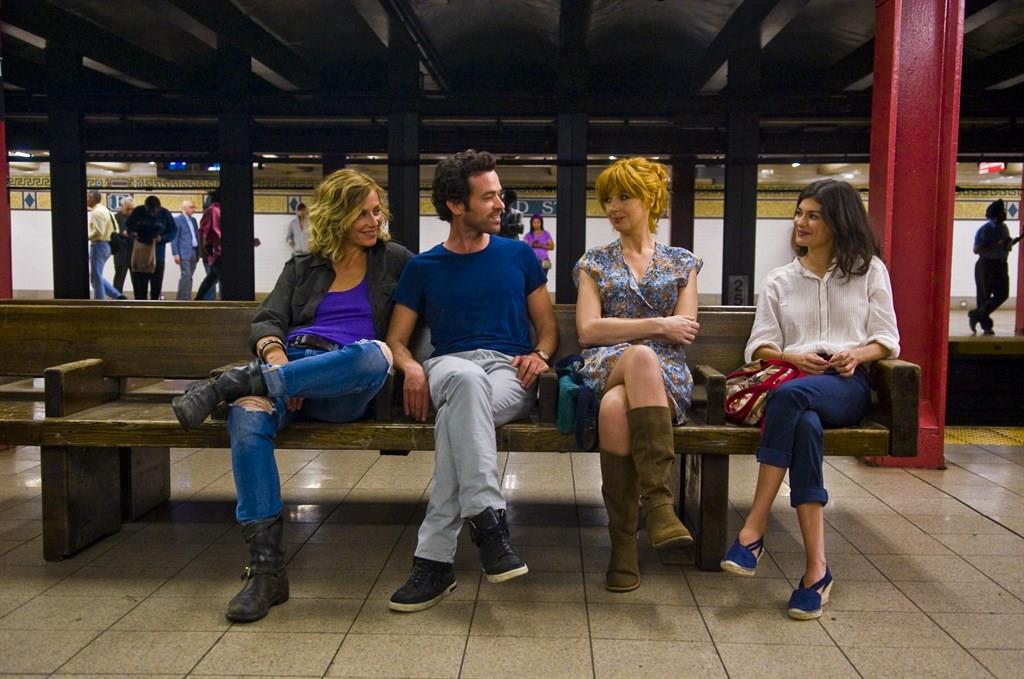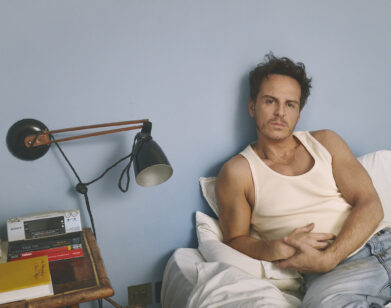Romain Duris Enters Adulthood

ABOVE: CECILE DE FRANCE, ROMAIN DURIS, KELLY REILLY, AND AUDREY TAUTOU IN CHINESE PUZZLE. PHOTO COURTESY OF COHEN MEDIA.
“I wasn’t sure I wanted to be an actor,” recalls Romain Duris of his early career. “How they wanted to make movies in France didn’t interest me,” he continues. Now 39, the Paris native made his professional debut in Cédric Klapisch’s Le périls jeune (1994). Twenty years later, and Duris is in New York promoting his seventh film with Klapisch—and the third film in a 12-year series—Chinese Puzzle.
Luck brought Duris into the film world—he was scouted by a casting agent in the street—but it’s directors like Klapisch that kept him there. “I met some interesting people,” he explains. “Directors like Olivier Dahan and Tony Gatlif—I did three movies with Tony Gatlif. I was just discovering cinema, so it was really these human encounters.”
In Chinese Puzzle Duris resumes the role of Xavier Rousseau, a character whom we first met in 2002’s L’Auberge espagnole. In the first film, Xavier was a hapless foreign exchange student living in a multi-lingual hostel in Barcelona with, among others, an English girl named Wendy (Kelly Reilly) and a Belgian girl named Isabelle (Cécile de France). The second film, Russian Dolls, picked up the characters three years later. In Chinese Puzzle, however, Xavier is an adult: he’s 40, a published author living in Paris, and a father of two young children. His partner is Wendy, that awkward ginger English girl who, somewhere along the way, became a beautiful woman. His life is settled. Unfortunately for Xavier, the third film begins with Wendy leaving him for another man and moving to New York.
EMMA BROWN: When you agreed to do L’Auberge espagnole, did you know that it was going to be the first in a series of films?
ROMAIN DURIS: No, not at all. I had done three movies with Cédric, so I knew him well. Before the first one he told me, “I’m going to do another movie without you. But before this big one, I’m going to do a little one with a little camera in Barcelona. It’s going to be a low-budget movie with not very many people.” So I said “Okay” and we shot it in two months.
BROWN: Everyone speaks a different language in L’Auberge espagnole, but what language did you speak on set—did everyone speak French?
DURIS: There was some Spanish. I learned Spanish for the film, and it was great to learn a language very quickly with a precise goal and date in mind. I think it’s harder to learn a language without having a goal. At the time, I needed to be able to speak Spanish two months later—Spanish with a French accent.
BROWN: Did you learn English at school?
DURIS: Yes. [in English] That’s why I have terrible bases. [in French] No, it’s true. It’s weird how you can learn something incorrectly. For a long time—and still now—I was very timid with English whereas with Spanish, I am less fluent than I am in English, but I’m not timid; I get by with the few words that I know. I know more English than Spanish, but I’m always a little embarrassed.
BROWN: Do you have a stronger attachment to Xavier than some of the other characters you’ve played?
DURIS: I have a strong attachment to him because I sort of adopted him. At the beginning, I didn’t like him. I didn’t understand him. In L’Auberge espagnole, I found him completely immature, naïve, and just clueless about life. He’s always second-guessing himself about little things. I sort of wanted to grab him and say, “Wake up, man!” So I really needed to find a way to inhabit him and to like him. But that’s the real work of an actor—I imagined what was going on in the head of this little 25-year-old who seemed to be discovering life. I went to universities and I looked at the type of young men there—the way they dressed. Because basically I had to play an antihero—a hero who is vulnerable, who doubts himself, who can be a bit dumb from time to time. But we didn’t want to make him a moron or a geek; he needed to be relatable. I think we succeeded—I say “we” because it was with Cédric—in presenting a person who was whole and who had depth, in spite of all of his weaknesses and his vulnerability. After that, I really enjoyed playing him. I didn’t like him, and then I discovered him. For the first film, I developed a bit of an awkward manner for him that became really fun to play. For Chinese Puzzle, I knew that I couldn’t play him like that anymore; at 40 years old, I couldn’t be a wide-eyed little boy. So I needed to erase his clueless side—his naïve side—and I was afraid I wouldn’t enjoy myself as much. I was worried that, to portray him as more mature and more serious, I’d lose the fun. But that didn’t happen. For Chinese Puzzle, we gave greater weight to the circumstances, and it was the circumstances that made it funny rather than Xavier’s mannerisms.
BROWN: Was Xavier the first character you didn’t immediately click with?
DURIS: Yes, I think so. And I need to be 100 percent for that role—he doesn’t cut any corners, Xavier, that’s why we like him. He opens himself completely to the audience. So I really needed to like him and to be sure of him.
BROWN: Didn’t Cédric write the role for you?
DURIS: Yes. For the first film. After that, he didn’t have a choice.
BROWN: It’s nice that he would write you a role that isn’t just an extension of your personality.
DURIS: Yes. It was great. But at the beginning, I was like, “Why me?” Because it wasn’t obvious to me. Even the costumes—I remember the first time I put on the costume, I just didn’t feel right. I was like, “How are we going to film a guy for an hour and a half—follow him like a hero—when he’s wearing these clothes that make him completely banal and vulnerable?” So it was a great exercise.
BROWN: Who, in your opinion, changed the most over the course of the three films?
DURIS: Everyone change a bit, but when you see Kelly Reilly in the first film, she’s really got a completely different look. Really. It’s miraculous the extent to which she became a woman between the first and second film. Cédric had envisioned a love story between Xavier and Wendy, but we didn’t know how she’d changed physically. Then we went to London to see her, and we saw this woman arrive and I said, “Wow…”
BROWN: Did you keep in touch between movies?
DURIS: Not really. Kelly lives in New York now, she really has this whole faraway life. The person I keep in touch with the most is Cécile de France.
BROWN: Do you remember the first time you came to New York?
DURIS: Yes. My first time in New York was with one of the guys from Daft Punk, who was a friend. It was a very long night out Paris and he told me, “I’m playing at a club in New York tomorrow.” I had never been to New York, so we spent all night discussing it, and in the morning at 6 am we flew to New York. I discovered the city like that. It was amazing. I was about 25, and it was really fun. Your first time in New York—especially for a little French guy like me—is magical. It’s still magical today; when I look at the streets there’s a richness and an energy that’s unique. But the first time, you realize the extent to which you’ve lived with New York. Especially my generation; I was born in 1974 and hip-hop, cinema, Woody Allen, all the Cassavetes movies— everything is in front of you in the street. It’s extraordinary to take that in all day.
BROWN: It can be a little overwhelming. It’s definitely not as clean as London or Paris.
DURIS: Ah, but I liked that. I found it too clean compared to the movies I knew that were sent in New York in the 1970s.
BROWN: Will you make a fourth film as Xavier?
DURIS: Cédric would really have to feel the need to make it—like this one. The danger in a series like this is to add to it for the wrong reasons. If, when Xavier is 50, Cédric feels like he has a lot to say, and a lot to say through these characters, then okay, we should do it. I don’t have a problem with it because I like my character; I like what Cédric portrays in his films through these characters. I can imagine revisiting the same characters when Xavier’s children are teenagers or at university. That could work.
BROWN: Does Cédric present you with a finished script or do you contribute along the way?
DURIS: I don’t. I leave it to Cédric. I don’t want to intervene. After the script is finished, I tell him what I think, but during the writing process, I leave him alone.
CHINESE PUZZLE OPENS IN NEW YORK ON MAY 16 AND IN L.A. ON MAY 23.






